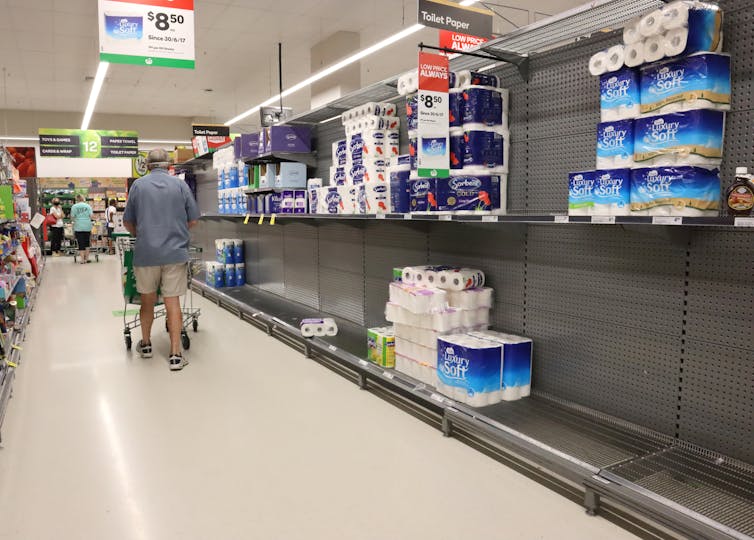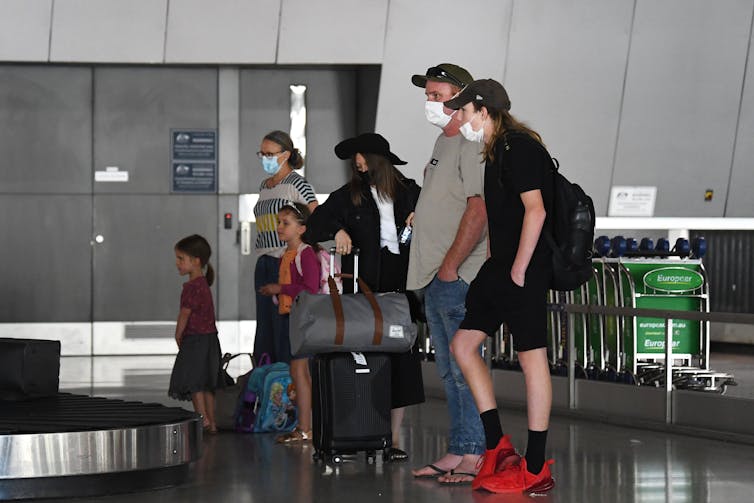it aims to squash an outbreak before it even starts
- Written by Catherine Bennett, Chair in Epidemiology, Deakin University
Greater Brisbane’s 72-hour COVID lockdown, which takes effect at 6pm on Friday, has a crucial difference from the months-long lockdown endured by Melbourne earlier this year, or the current restrictions aimed at stamping out Sydney’s COVID clusters.
In Brisbane’s case, it’s just a circuit-breaker designed to immediately minimise everyone’s number of close contacts until we can establish whether anyone has caught the virus from the one known case: a hotel quarantine cleaner who was moving around in the community for five days before testing positive yesterday.
Melbourne’s lockdown, in contrast, was about suppressing viral transmission from cases that numbered in the thousands and where workplaces were the main driver of spread. That meant isolating everyone until the continual seeding back into the community could be stopped.
Brisbane’s shorter lockdown allows health authorities to find and test anyone who might, for instance, have been on public transport with the one woman we know has been infected so far.
Queensland Premier Annastacia Palaszczuk said authorities were aiming to “go hard and go early”, given the infected woman is known to have contracted the more infectious UK mutant strain of the coronavirus.
This is why the announcement has been prompt: the time frame for circuit-breakers must be short but the list of allowable reasons for leaving the house is relatively generous to compensate. Besides the usual essentials such as shopping, health care and exercise, it also includes attending workplaces when working from home is impractical, and going to weddings and funerals (with restricted numbers) because people may have immediate plans they cannot change.
That said, the panic-buying witnessed in Brisbane’s shops today is really disappointing. The shops will still be open, you can still shop as one of your reasons to leave home, and everyone crowding into shops at the start of lockdown actually increases the risk of infection.
 The same old story.
Darren England/AAP Image
The same old story.
Darren England/AAP Image
We’ve seen how these things play out - the empty shelves and toilet paper shortages. We wouldn’t wish Melbourne’s situation on anybody, but they have shown it is possible to live with lockdown. It’s actually the panic-buying that causes the shortages in supply. But it just seems to be an instinctive human reaction that can’t be prevented.
Does it matter that the ‘UK superstrain’ is involved here?
The protocol for handling a situation like this should be the same regardless of whether the “UK superstrain” is involved or not.
With a low number of cases, it doesn’t make much of a difference which variant is responsible. It would make a difference if case numbers climbed or the virus got into workplaces and began to get a foothold in the community. Then, the fact this strain spreads more rapidly would become a danger.
The fact that Melbourne’s lockdown successfully suppressed within a matter of weeks a new “mutant” strain with some of the same genetic changes as the UK variant, while the variant responsible for more than 99% of the second wave was a supposedly less infectious strain, shows that what matters most is the how the epidemic seeds, where transmission is established and how it is controlled, not just the COVID strain itself.
Read more: Finally at zero new cases, Victoria is on top of the world after unprecedented lockdown effort
Brisbane’s current situation does show the value of more frequent testing of hotel quarantine staff. When we had the Adelaide outbreak, I advocated for daily testing, or testing on each shift, to be the national testing standard for all workers on the quarantine frontline. The Victorian government has already applied it, and National Cabinet has now established this as the the national standard.
With more frequent testing, we wouldn’t have the situation we have in Queensland. Instead, the woman who is believed to have been infectious since January 2 would have tested positive on her last shift that day, rather than when she developed symptoms several days later. This would have removed the risks associated with her subsequent movements in the community.
Testing times for air passengers
National Cabinet has also announced a series of new measures aimed at reducing the risks associated with air travel and the potential arrival of COVID cases among returned travellers.
All passengers will be required to test negative before boarding a flight to Australia, and masks will be mandatory on all international and domestic flights and inside airports.
Testing positive for a test completes within 72 hours of a flight will rule that passenger, and any of their household contacts, from boarding the flight. This is a good way of taking the pressure off our returnee quarantine process, although it will not eliminate the risk entirely. It is still possible passengers or crew will bring the virus into Australia as some may still be incubating an infection when in transit.
While it’s impossible to rule out that positive cases will arrive among returned travellers, particularly from the UK, it will undoubtedly reduce the proportion of arrivals who are positive, and PCR testing is much more reliable than screening for symptoms.
Mandatory masks are also a sensible idea - many passengers were already wearing them so this about making it mandatory and consistent across all carriers. If you don’t have the virus, the last thing you want is to contract it on the plane.
 Mandatory masks make sense for air travellers.
James Ross/AAP Image
Mandatory masks make sense for air travellers.
James Ross/AAP Image
Border closures still a blunt tool
While Brisbane’s lockdown covers a sizeable area of Queensland’s southeast, wholesale border closures — such as Western Australia’s new decision to bar arrivals from Queensland — is overkill.
We must be able to manage our response to this pandemic nationally. This is not the time for states to be saying “our processes are better than yours”. Instead, we should have a coordinated process, so if you have cases arriving in your state, we can all work together to manage it.
Read more: Australia's mishmash of COVID border closures is confusing, inconsistent and counterproductive
Closing the border to travellers from specific hotpots: yes. That’s how you manage risk. But doing it beyond the hotspots, especially if there aren’t even any known exposure sites outside the hotspot, seems unnecessary and counterproductive, especially in the context of a circuit-breaker compared with evidence of unknown community transmission.
Hard border closures bring a host of health and economic consequences.
Masks mean you can reduce transmission risk, keep borders open and contain local clusters that start before you know the virus has landed in your area – masks are absolutely the way to go. It’s just something you can put in your pocket, and authorities can step the rules up and down as required. True, we will see more clusters, but they will likely be smaller and contained more promptly.
Authors: Catherine Bennett, Chair in Epidemiology, Deakin University



















